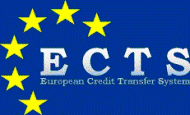European Credit Transfer System (ECTS)

- What is ECTS
- What does ECTS offer to students?
- ECTS grading system
- What is required to participate in the ECTS program?
- Information regarding recognition of academic achievements
The European Credit Transfer and Accumulation System (ECTS) is a component of Erasmus, the EU’s higher education and training program. ECTS strives to create a harmonization of the European higher education system via a mutual recognition of academic achievements, which, in turn, should lead to the easier mobility of students in a united Europe.
Completing a period of study in another EU Member State can lead to a student’s academic and personal enrichment; ECTS aims to allow achievements abroad to be beneficially integrated into a student’s program of study in his or her respective native country.
2. What does ECTS offer to students?
ECTS allows students the opportunity to complete a learning agreement before going abroad and to be informed about the transfer of credits for use towards completion of their study programs at their home institutions. By successfully completing and adhering to the learning agreement, students can be assured that their academic achievements abroad will be recognized by their home institution.
The ECTS grading system ranges from A (the best grade) to Fx (failure). ECTS grades are based on percentages. Grades express student performance in relation to the most successful students in a course (i.e. the top 10% of students receive an A, the next 25% receive a B, etc.).
4. What is required to participate in the ECTS program?
First off, you need to be accepted into an Erasmus program. Following acceptance into a program, you will receive an application (ECTS Application Form), a form requesting release of a copy of your academic achievements to date (Transcript of Record) and the Erasmus Learning Agreement for program participation. These forms do not only serve as your application to your partner university abroad, but in the case of the Learning Agreement, they also provide the best possible assurance that your academic achievements abroad will be recognized by your home institution.
5. Iinformation regarding recognition of academic achievements:
At the European University Viadrina, the staff of the Department of International Affairs provides information pertaining to ECTS.
5.1 Important information for students from abroad:
ECTS was implemented in all of Viadrina’s faculties several years ago.
- Information about the ECTS credits granted for completion of individual courses are listed in the course catalogues (Vorlesungsverzeichnisse) of the individual faculties
- If you have lost the ECTS forms from your home university, you may use Viadrina’s ECTS forms (i.e. ECTS Student Application Form, Learning Agreement, Transcript of Records)
5.2 Important information for Viadrina students:
If you are currently abroad and have misplaced your forms, you may download them here.
Upon being nominated for a period of study abroad, please contact the appropriate ECTS Coordinator or ECTS Advisor and familiarize yourself with the correct procedure for recognizing your academic achievements abroad. Please make sure to do this before your departure!
